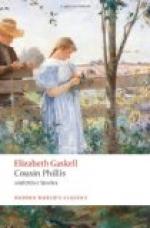he gave, all the raptures he went into. I held
the letter loosely in my hands, and looked into vacancy,
yet I saw the chaffinch’s nest on the lichen-covered
trunk of an old apple-tree opposite my window, and
saw the mother-bird come fluttering in to feed her
brood,—and yet I did not see it, although
it seemed to me afterwards as if I could have drawn
every fibre, every feather. I was stirred up to
action by the merry sound of voices and the clamp
of rustic feet coming home for the mid-day meal.
I knew I must go down to dinner; I knew, too, I must
tell Phillis; for in his happy egotism, his new-fangled
foppery, Holdsworth had put in a P.S., saying that
he should send wedding-cards to me and some other
Hornby and Eltham acquaintances, and ‘to his
kind friends at Hope Farm’. Phillis had
faded away to one among several ‘kind friends’.
I don’t know how I got through dinner that day.
I remember forcing myself to eat, and talking hard;
but I also recollect the wondering look in the minister’s
eyes. He was not one to think evil without cause;
but many a one would have taken me for drunk.
As soon as I decently could I left the table, saying
I would go out for a walk. At first I must have
tried to stun reflection by rapid walking, for I had
lost myself on the high moorlands far beyond the familiar
gorse-covered common, before I was obliged for very
weariness to slacken my pace. I kept wishing—oh!
how fervently wishing I had never committed that blunder;
that the one little half-hour’s indiscretion
could be blotted out. Alternating with this was
anger against Holdsworth; unjust enough, I dare say.
I suppose I stayed in that solitary place for a good
hour or more, and then I turned homewards, resolving
to get over the telling Phillis at the first opportunity,
but shrinking from the fulfilment of my resolution
so much that when I came into the house and saw Phillis
(doors and windows open wide in the sultry weather)
alone in the kitchen, I became quite sick with apprehension.
She was standing by the dresser, cutting up a great
household loaf into hunches of bread for the hungry
labourers who might come in any minute, for the heavy
thunder-clouds were overspreading the sky. She
looked round as she heard my step.
‘You should have been in the field, helping with the hay,’ said she, in her calm, pleasant voice. I had heard her as I came near the house softly chanting some hymn-tune, and the peacefulness of that seemed to be brooding over her now.
’Perhaps I should. It looks as if it was going to rain.
’Yes; there is thunder about. Mother has had to go to bed with one of her bad headaches. Now you are come in—




